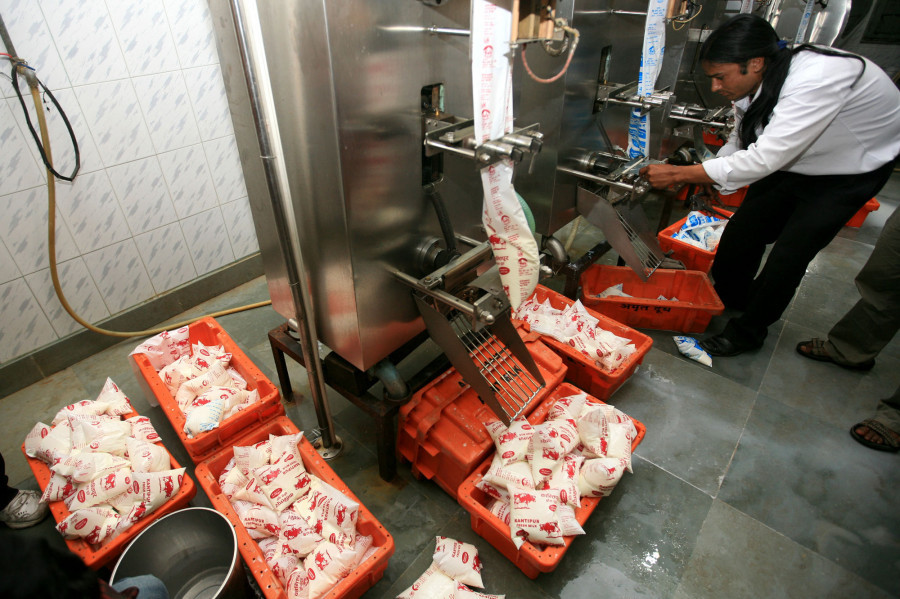Money
Lockdown disrupts dairy sector as sales suffer, feed becomes scarce
With hotels and restaurants shut, farmers can't sell their milk because there are no buyers. Residents also do not want to come out of their houses to buy milk due to risk of infection.
LP Devkota, Biplav Bhattarai & Chandani Kathayat
Dairy farmer Chudamani Dhakal of Lekbeshi Municipality-10 used to sell 300 litres of milk daily to dairies in Birendranagar. His buffalo farm houses 50 buffaloes, 27 of whom give milk.
After the government issued prohibitory orders putting Surkhet district under lockdown, Dhakal's milk sales plunged to 100 litres daily.
With hotels and restaurants shut and people gone back to their villages, farmers can't sell their milk because there are no buyers.
Residents don't want to come out of their houses to buy milk either because of the risk of catching the infection. "People are too scared to go to the grocery stores," Dhakal said.
"Dairy owners ask us to bring only a small quantity of milk because they think they may not be able to sell it," he said. Dhakal is also having a hard time finding feed for his buffaloes because of the stay-home order.
Dairy owner Krishna Chalise of Birendranagar-5 said selling milk had become difficult with the hotels closed and fewer consumers. "Due to the slowdown in sales, we have told farmers to bring less milk," he said.
Even though some dairy farmers are having difficulties selling their milk, Tirtha Parajuli of Darnakot, Birendranagar-14 says his problem is not being able to produce enough to fulfil demand.
Parajuli's cows and buffaloes are giving less milk as they do not have enough grass to feed on due to a drought.
"We have not been able to obtain nutritious feed for our cattle due to the restriction order," he said. "I used to take 650 litres of milk to market daily, but now I have been taking only 150 litres."
While some farmers are complaining that their milk is remaining unsold, Parajuli says he has been selling milk to seven dairies in Birendranagar.
In Jumla, farmers have not been able to sell their milk for the past three weeks due to the second wave of the coronavirus. Sales came to a stop after the District Administration Office imposed a prohibitory order due to the pandemic.
Commercial farmers of Guthichaur Rural Municipality-5 had been delivering 40-50 litres of milk daily to the district headquarters Khalanga. But after all dairies in Khalanga shuttered, the sale of milk has stopped.
"The local administration has prevented people from even walking around," said Bishnu Dhital, a buffalo farmer. "People are afraid to buy milk because of the pandemic," he said. Dhital has been rearing buffaloes commercially in the village for seven years.
Narayan Dhital of Guthichaur said that buffalo rearing was a major source of livelihood for him, and he lost his income after the pandemic.
"The administration has banned the distribution of dairy products even though it falls under essential services," he said. "I am left with 50 litres of unsold milk in my home everyday," he said.
Commercial farmers who have been making their living from animal husbandry have been hard hit.
Kamal Dhital said that it had become difficult to meet his basic home expenses with milk remaining unsold at his home. His commercial farm produces 40 litres of milk daily. With no sales and no revenues, he has been facing problems feeding his buffaloes.
"My expenses are increasing by the day, but I am left with unsold milk. How can I make a living?" Dhital said. "Milk goes to waste everyday due to lack of skills and equipment to make dairy products out of it," he said.
Bishnu Dhital, who has been rearing buffaloes since 2005, was earning up to Rs100,000 monthly by selling milk.
"Earnings are down to zero now. Since there are no sales, 50 litres of milk is being wasted daily," he said. He was earning up to Rs3,500 daily by selling milk and dairy products in Khalanga. He used to sell milk at Rs70 per litre in Khalanga market.
Local leader Anil Devkota said that the lockdown had affected both consumers and farmers even though it is necessary to consume milk daily to increase immunity. According to him, the farmers had sold milk during last year's lockdown.
Chief District Officer Bhupendra Thapa said that sales and distribution of milk had been prohibited due to the deadly second wave of the coronavirus and steeply rising number of infections.
"The first thing now is to protect everyone from infection, and that is why we have stopped the sale and distribution of agricultural products to prevent further infections," he said.
The main occupation of Ram Kumar Gurung of Jamuna, Sandakpur-5 is making dairy products. He used to produce ghee and hard cheese by processing more than 100 litres of milk daily. Now he is worried how long he will be able to keep his dairy factory going.
Gurung's neighbour Pradip Bhattarai is also facing the same problem. Dozens of dairy producers like Gurung and Bhattarai are suffering because they can't take their products to market right away while they continue to make ghee and hard cheese by buying milk from farmers.
Dairy farmers and factories are finding life difficult due to the lockdown that has been clamped in most parts of the country to control the second wave of Covid-19.
Even though the administration has not banned the transportation of agricultural products, the rural municipality has banned the operation of vehicles except for urgent work. But automobile owners fear to drive anywhere because of the risk of infection.
There are 30 dairy factories in the Jamuna area alone, and around 150 factories in Sandakpur Rural Municipality. Most of the factories process 50 to 200 litres of milk daily. As the factory operators are not able to take their products to market, they cannot pay the farmers regularly.
Farmers are also facing problems due to the lack of feed for their dairy cattle. "The situation is such that we are able to feed the cows only grass, as other types of feed are not available," said Shila Gurung of Sandakpur.
Dairy factories suffered losses during last year's lockdown, and the owners worry that their losses may mount this year if the current lockdown is extended. "It is not sufficient for us to buy the milk only. We need to make payment to the farmers by selling our products in the market," Bhattarai said.
The ghee produced in the area is sold in the markets of Kathmandu and as far away as Jhapa. The local hard cheese has been exported to the United States and Japan. But due to the lockdown, it has not been possible to take the products to market.
Dairy owners and farmers want the agencies concerned to work to keep the dairy business going, as it has become a good source of employment and income in the village.
A dairy factory produces 5 kg of hard cheese and 4 kg of ghee daily by processing 100 litres of milk. Ghee is sold at Rs550 per kg and hard cheese at Rs900 per kg.




 9.89°C Kathmandu
9.89°C Kathmandu

















